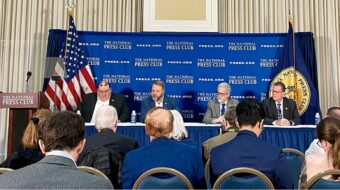
WASHINGTON—The Letter Carriers have big doubts about the commitment to the U.S. Postal Service of David Steiner to be the nation’s next Postmaster General. Steiner is a rich corporate executive and a board member of FedEx, a top competitor of the USPS.
The White House has yet to officially confirm sending Steiner’s name to the USPS board, which holds its quarterly meeting on May 9, with the acting Postmaster General presenting the latest financial report.
Letter Carriers (NALC) President Brian Renfroe found disturbing data about the 60-year-old Steiner. His union posted a video, from Workers United, where Steiner smilingly said that when he took over as CEO of Waste Management, Inc.—the big trash hauling firm—it was 32% unionized, and now it’s 20% union.
Steiner himself told the interviewer the pay was the same at WMI as it was at unionized haulers, but he claimed its health care plans were better. He admitted he pulled WMI out of the Teamsters Central and Southern States pension fund to set up his firm’s own pension plan.
What Steiner didn’t say is that the Teamsters fund is a joint labor-management fund and the most financially hard hit one by the financier-caused 2008 Great Recession. It’s since been a recipient of federal long-term repayable loans to get it back on its feet, thanks to legislation authored by then-Sen. Sherrod Brown, D-Ohio, and union legislative representatives.
Renfroe called Steiner a union-buster. National Labor Relations Board records show Teamsters Local 667 was the most recent union to try to organize a WMI site, in Memphis, Tenn. It lost 44-4 in the middle of last year.
Steiner also didn’t talk about how rich he is or how much he gave to the GOP. Open Secrets.org reports that starting in 2002, Steiner contributed just over $36,000, with all but $5,000 of it going to Republican candidates or campaign finance committees. The sole Democrat was former Pennsylvania Gov. Ed Rendell.
That $36,000 is paltry compared to Steiner’s riches. GuruFocus, an investment-oriented website, puts Steiner’s net worth at $147 million-plus as of the close of stock market trading on May 8. That includes $8 million worth of FedEx stock.
And that holding rang alarm bells for NALC’s Renfroe. So did declining unionization at WMI, given the already low pay and often lousy working conditions in waste hauling.
“Steiner comes directly from service on FedEx’s board of directors, presenting a clear conflict of interest,” Renfroe said. “Steiner didn’t just stroll in from the private sector—he comes straight from one of the Postal Service’s top competitors.
“His selection isn’t just a conflict of interest. It’s an aggressive step toward handing America’s mail system over to corporate interests. Private shippers have been waiting to get USPS out of parcel delivery for years. Steiner’s selection is an open invitation to do just that.”
As Waste Management CEO, “Steiner built his brand on union-busting, slashing jobs, and replacing workers with machines. He has publicly bragged about shrinking the union footprint” there, Renfroe added.
Handed the keys
“Now, he’s being handed the keys to one of the nation’s largest unionized employers,” since an estimated 90% of all USPS workers, including Letter Carriers, Postal Workers, and Mail Handlers/Laborers, are union members. Most are also workers of color, women, or both.
“At a time when collaboration with workers helped USPS turn a $144 million profit in the last quarter of 2024, this decision flies in the face of everything that’s working,” Renfroe continued. “This isn’t just bad policy—it’s a direct assault on the workers who keep the mail moving and the public connected.
“And make no mistake: If this appointment stands, it threatens 7.9 million jobs tied to the postal industry and service to over 300 million Americans.” Anticipating the board will follow Trump’s recommendation, Renfroe said his members “are outraged the board chose an anti-union postmaster general with a major conflict of interest.” And it “shows open contempt for the work of America’s Letter Carriers and the public good.”
Ironically, Steiner’s predecessor, Louis DeJoy, was a parcel company CEO at XPO Logistics when Trump foisted him on the Postal Service five years ago. DeJoy favored parcels and packages over first-class letters—the USPS’s most-reliable moneymaker. DeJoy was also a GOP donor with contributions back to ultra-racist Sen. Jesse Helms from DeJoy’s home state, North Carolina.
The Postal Workers had no immediate comment specifically about Steiner’s selection. Instead, they released a survey showing huge majorities of all voters—including rural voters who cast ballots for Trump—dead set against privatizing the USPS. “Customers strongly believe proposals to privatize the United States Postal Service should be marked ‘Return to Sender,’” APWU said.
The survey of 1402 voters shows privatization lost, 26%-60%. All subgroups opposed privatizing the USPS. That includes the rural voters, who plumped for Trump by 23 percentage points over Democratic Vice President Kamala Harris in last year’s election.
The Mail Handlers, a Laborers sector, previously also warned against privatization, speaking out when DeJoy stepped down on March 26. The USPS board “should look for a leader who understands it must remain a public entity that should not be subject to privatization at any level. A privatized Postal Service will do nothing but drive up prices that make service unattainable for most and alienates those in remote areas,” the Mail Handlers said then.
APWU President Mark Dimondstein, who criticized DeJoy’s “modernization” plans, again touted other ways the USPS could increase its revenues.
Dimondstein said the USPS could ship wine or beer, handle check cashing and wire transfers for customers—as it did until 1967—and set up electric vehicle charging stations in USPS parking lots. Except for the charging stations, Sen. Bernie Sanders, Ind-Vt., a champion of workers, unions and, in the last debate over USPS’s finances, promoted those same ideas.
That EV point is especially relevant since congressional pressure forced DeJoy to buy EVs to replace the aging USPS fleet, not the gas guzzlers DeJoy wanted to purchase.
“There is so much more the USPS could do for our customers,” said Dimondstein. “This is the people’s postal service, emphasis on ‘service.’ It shouldn’t be sold off or diminished. The U.S. Mail is not for sale.”











